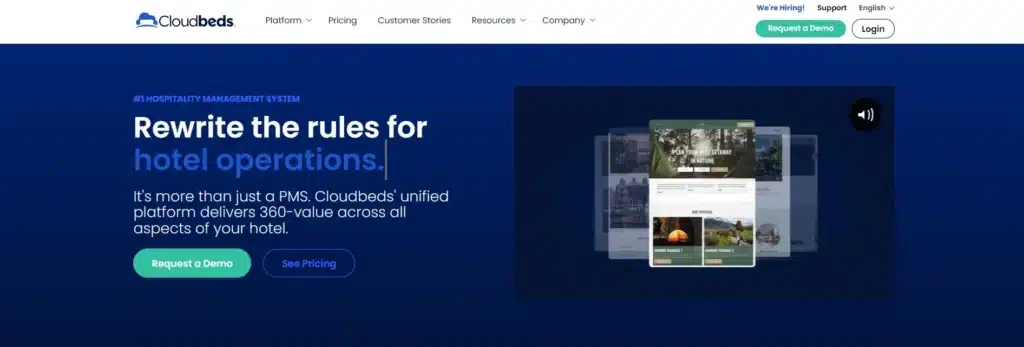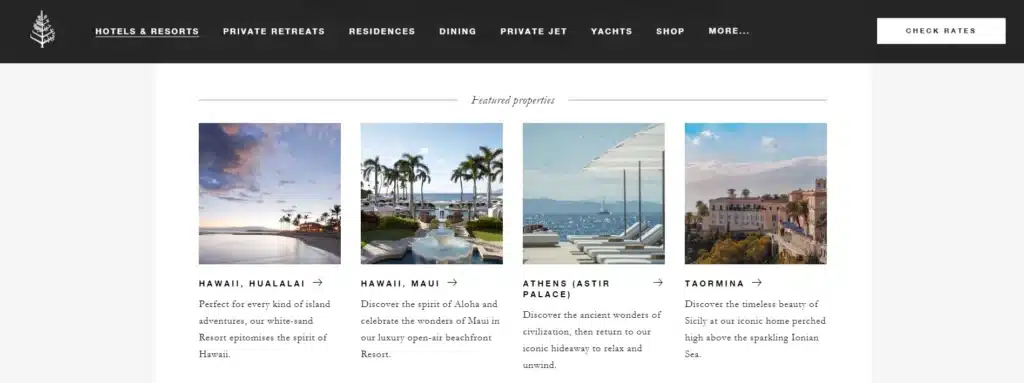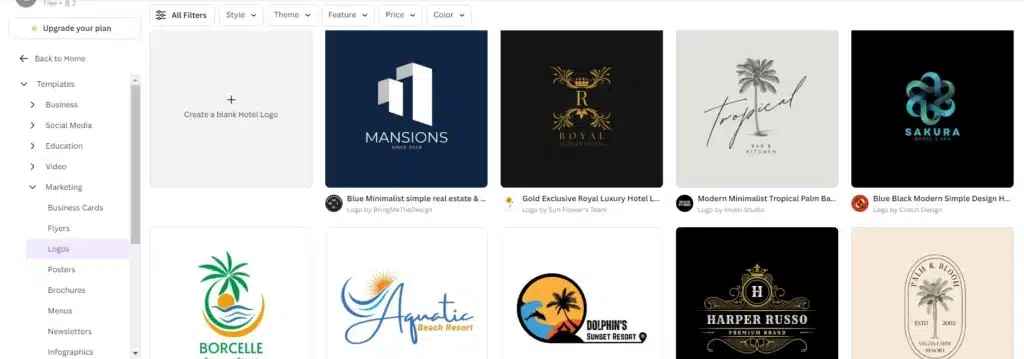Your hotel website serves as the first impression for potential guests, influencing their decision to book a stay. A well-designed site not only showcases your hotel’s unique features and amenities but also ensures a seamless booking experience.
This guide will walk you through the key steps to build a hotel website that attracts visitors, engages them with high-quality content, and converts them into loyal guests.
From selecting the right template to incorporating essential pages and optimizing for SEO, we’ll cover everything you need to know to make your hotel website stand out.
How to Create a Hotel Website?
Building a hotel website that captivates visitors and drives bookings requires thoughtful planning and strategic execution. From selecting the perfect template to incorporating essential features, every detail matters.
Let’s explore the key elements needed to create a compelling hotel website that stands out in a crowded market.
Choose a Template
Selecting the right template is the first step in website design for hotels. A well-chosen template sets the tone for your site and ensures it aligns with your brand’s aesthetic and functional needs.
Here are some tips to help you choose the perfect template:
- Explore Hotel Website Examples
Browse through a variety of hotel websites to gather inspiration. Pay attention to the layout, color schemes, and functionalities that catch your eye. Look for elements that reflect the experience you want to offer your guests.
- Analyze Competitors
Check out your competitors’ websites to see what works well in your industry. Identify the features and designs that appeal to you and think about how you can incorporate them into your site.
- Align with Your Hotel’s Aesthetic
Choose a template that matches your hotel’s unique style and ambiance. Whether your hotel is modern, luxurious, or cozy, the template should reflect these characteristics.
- Functional Needs
Ensure the template meets all the functional requirements of your site, such as booking systems, galleries, and contact forms. The design should facilitate a smooth user experience from browsing to booking.
- Mobile-Friendly
Make sure the template is fully responsive, meaning it adapts seamlessly to different screen sizes and devices. With a significant portion of users accessing websites via mobile devices, a mobile-friendly design is crucial.
Learn more: The Importance of Mobile Optimization for Hotel Websites
Incorporate a Booking and Payment Solution
An essential component of any hotel website is a seamless booking and payment solution. Ensure that your website design includes an integrated booking system that is both user-friendly and secure.
Key Factors to Consider When Choosing a Booking Solution:
| Factor | Description |
| User-Friendly Interface | Choose a system that is easy for guests to navigate, allowing reservations with minimal clicks. |
| Secure Payment Gateway | Ensure the gateway is secure and supports multiple payment options to build trust and reduce abandonment. |
| Real-Time Availability | Integrate a system that shows real-time room availability to enhance user experience. |
| Confirmation and Notifications | Set up automatic email confirmations and notifications to keep guests informed about their bookings. |
Examples of Booking Solutions:

- Cloudbeds: This platform integrates seamlessly with your website, offering booking, payments, and property management in one package.
- SiteMinder: Provides a booking engine that integrates with your hotel’s website, offering secure payment options and real-time availability updates.
- Checkfront: Easily integrates into your website, offering a user-friendly booking interface, real-time availability, and secure payment processing.
- Rezdy: Integrates with your website to offer real-time booking capabilities and automated notifications, known for its simplicity and ease of use.
Add the Relevant Pages
A successful hotel website should include several key pages: Home, Rooms, Amenities, Dining, Events, and Contact Us. These pages provide visitors with all the information they need to make a booking decision.
More Useful Articles:
Brand it Right
Your hotel website should reflect your brand’s identity. Use consistent colors, fonts, and imagery that match your hotel’s style. Branding helps in creating a cohesive look and feel, making your site more memorable.
1. Consistent Colors and Fonts
Use a color scheme and fonts that align with your hotel’s overall branding. Consistency in colors and typography creates a cohesive and professional look. Ensure that the chosen colors and fonts are used uniformly across all pages and elements of your site, reinforcing brand recognition.
2. High-Quality Images
Professional, high-resolution images are crucial for showcasing your hotel’s best features, such as rooms, amenities, dining areas, and scenic views. High-quality visuals significantly impact guests’ perceptions and decision-making, so investing in professional photography to capture the essence and luxury of your hotel is essential.

3. Logo and Slogan
Your hotel’s logo and slogan should be prominently displayed on the homepage and other key pages to reinforce brand identity. Consistently place the logo and slogan in the same location on all pages, such as the header or footer, for easy identification.
Here is a list of AI logo makers for you:
For a customized experience, you can always contact our team at DesigningIT and get a well-thought-out logo that reflects your hotel identity!

4. Tone of Voice
Maintain a consistent tone of voice in your content that matches your brand personality. Whether your hotel’s brand personality is formal, friendly, luxurious, or casual, the tone should be consistent throughout all written content. Use a tone that engages visitors and reflects the experience they can expect at your hotel. For instance, a luxury hotel might use elegant and sophisticated language, while a family-friendly resort might adopt a warm and welcoming tone.
To ensure consistency and effectiveness in your branding, create a comprehensive brand style guide that outlines your hotel’s colors, fonts, logo usage, image guidelines, and tone of voice. This guide will help maintain consistency across all marketing materials and website updates.
Incorporate visual storytelling elements to highlight the unique aspects of your hotel. Use images and videos to tell a story about the guest experience, showcasing what makes your hotel special. Adding interactive elements such as virtual tours, image galleries, and videos can provide an immersive experience for visitors, helping potential guests visualize their stay and increasing engagement.
Feature guest testimonials and reviews prominently on your site. Positive feedback from past guests can enhance credibility and attract new visitors. Additionally, integrating elements of local culture and attractions into your website design and content adds to the uniqueness of your brand and provides valuable information to potential guests.
Learn more: What is Hotel Branding? Main Elements of Hotel Branding Identity
Pay Attention to SEO
Google’s recent API documentation leak on May 27, 2024, brought to light over 2,500 pages of internal details about their search algorithm. After a deep dive into these documents, SEO experts revealed crucial insights into what Google actually tracks.
Here’s what you need to know when focusing on the SEO aspects of your hotel website.
1. Clicks & CTR (NavBoost)
For years, Google has denied that clickthrough rates (CTR), time on page, and other click-related metrics significantly influence their algorithm. However, the leaked documents provide clear evidence that click data plays a crucial role, heavily analyzed by Google’s NavBoost algorithm.
- Clicks & CTR Matter: Contrary to Google’s public denials, clicks and CTR do affect rankings. This leak confirms that user interactions, such as clicks and how long they stay on a page, are indeed considered in ranking decisions.
- Clickstream Data: Clickstream data tracks the series of clicks users make while browsing the internet. This data, primarily collected through Chrome browsers, reveals user behavior and preferences. Given that Chrome is used by 65.31% of the world’s internet users, Google has a substantial dataset to draw from.
- Definition: Clickstream data tracks the sequence of clicks made by a user while browsing the internet, revealing browsing behavior and preferences.
- Usage: Google uses this data to understand user interactions and adjust search rankings accordingly.
2. Domain Age
The age of a domain can influence search engine rankings. Older domains tend to have an advantage, although the exact impact of this factor is still unclear. The recent leak confirmed that Google does consider domain age as part of its ranking criteria. This means that if your hotel website has been around for a while, it might naturally enjoy a better position in search results compared to newer competitors.
3. Subdomains as Separate Entities
The leaked documents also revealed that subdomains are treated as separate entities by Google. This means they do not inherit the authority of the main site. For hotel websites, this is particularly important if you have a blog or a separate booking platform hosted on a subdomain. To ensure these subdomains rank well, they need to build their own authority.
| Our Recommendation: To avoid this issue, consider using the same content management system (CMS) for your main site and blog, or use a reverse proxy if they are on different servers. This strategy helps maintain a unified authority and enhances your overall SEO efforts. |
4. New Websites in the Sandbox?
New websites often experience a period where their rankings are artificially suppressed, a phenomenon commonly referred to as being in the “Google Sandbox.” This period allows Google to evaluate the quality and trustworthiness of a new site before allowing it to compete for higher rankings. This makes sense as it ensures only reliable and high-quality sites rise to the top.
For new hotel websites, this means that patience and consistent quality improvements are key. During this initial period, focus on building quality content, acquiring reputable backlinks, and enhancing user experience to prove your site’s value to both users and search engines.
Our Specific Hotel Industry Findings from the API Leak
The leaked Google documentation offers limited but valuable insights specifically for the hotel industry. Here’s what hotel marketers need to know:
Criteria for Qualifying Good Hotel Sites
Google uses several criteria to determine the quality of hotel sites. These include:
- Language of the Hotel Website: The content must be in the appropriate language for the target audience.
- Aggregation: Whether the site aggregates hotel-related and travel information from various sources.
- Official Attraction/Entity Status: Sites representing official attractions or recognized entities are favored.
- Official Hotel Websites: The official websites for hotels are usually ranked higher, so it’s always a good idea to create a website for your hotel and include all the important information there.
Classification of Hotel Types
Google also categorizes hotel types and tracks various attributes related to hotels and rentals:
- Hotel Types: Includes motels, hotels, youth hostels, and guest houses.
- Star Ratings: Ratings that indicate the quality of the hotel.
- Occupancy Constraints: Information on room configurations, including the number of bathrooms and bedrooms.
Content and backlinks
The overall quality of your website significantly affects the rankings of individual pages. Poor-quality content can negatively impact the performance of high-quality pages. Therefore, maintaining consistently high standards across your entire site is essential.
Here’s how to enhance your site’s performance by focusing on content and backlinks:
1. Dwell Time and Click Classification
Google monitors how long users stay on a website before returning to the search results, categorizing clicks as “good” or “bad.” This metric, often referred to as dwell time, is a strong indicator of content quality. The leaked documents reveal that “Good Clicks” and similar measures are integral to their algorithm.
Example: If visitors spend a significant amount of time on your hotel website, it signals to Google that your content is valuable and relevant. This can positively influence your search rankings.
2. Content Update Frequency Impacts Index Storage Location
Indexing Tiers: Google’s index, called “Alexandria,” stores URLs in three different tiers based on the relevance and timeliness of the content. Fresh, frequently updated content is stored in flash memory, making it more likely to appear in searches related to current events and trending topics. Less frequently updated content is stored on solid-state drives, while stale, rarely updated content resides on hard drives.
| Our Recommendation: Regularly updating your content ensures it is stored in higher-priority tiers, which can enhance visibility and ranking. Frequently refreshing your hotel website’s content can have a significant impact on SEO performance. |
3. Topical Authority and Focus
Topical Relevance: Google evaluates the topical relevance and authority of your content through metrics like “siteFocusScore,” “siteRadius,” “siteEmbeddings,” and “pageEmbeddings.” Maintaining a focused content strategy helps establish your site as an authority in specific areas. This concentrated approach makes it easier to rank for your primary topics and harder to rank for unrelated competitive topics.
| Recommended Strategy: Create and maintain content that is highly relevant to your hotel and its unique selling points. For instance, if your hotel is known for its spa services, ensure that your content around spa services is detailed, comprehensive, and regularly updated. |
Discover more: Innovative Content Marketing Ideas & Strategies for Hotels
4. Backlink Quality and Traffic
Backlinks are categorized based on traffic and clickstream data. Links from high-traffic pages are more valuable as they indicate that the referring site is reputable and trusted.
| Recommended Strategy: Focus on acquiring backlinks from reputable sites with substantial traffic. Ensure that these links are relevant to your niche, as backlinks from unrelated sites might not provide the desired SEO benefits. |
Tip: Newly acquired links have a greater impact than older ones, so maintaining a consistent link-building strategy is crucial. Regularly seek out opportunities for guest posts, collaborations, and other backlinking strategies to keep your profile robust.
Technical SEO Factors
Technical aspects of SEO are crucial for travel websites, especially large sites like Online Travel Agencies (OTAs), as they ensure search engines can effectively crawl and understand your content. Here’s what we learned from the leak about technical SEO:
1. Page Layout and Content Positioning:
Important Content Placement: Place crucial content at the top of the page. Google may not index the entire page, so key details should be immediately visible.
Example: For hotel websites, include essential information such as “About the destination” and primary amenities at the top of your pages. This ensures that the most critical details are indexed and recognized by search engines, enhancing your site’s relevance and ranking.
2. TitleMatchScore:
Ensure your page titles match the primary search terms you are targeting. This alignment can significantly impact your rankings.
| Recommended Strategy: Use relevant keywords in your page titles that reflect the main content of the page. For instance, if your page is about luxury hotel amenities, ensure that terms like “luxury hotel amenities” or “premium hotel services” are included in the title. |
3. Date Factors in SEO:
Google considers multiple dates in its SEO algorithm – bylineDate (explicitly stated in the article), syntacticDate (from the URL or Title), and semanticDate (derived from page content). Consistency across these dates is crucial.
| Recommended Strategy: Ensure the published date is accurately reflected in the title and content. Avoid using dates in URLs, as changing the article date would require a redirect, which can complicate SEO efforts. Instead, maintain date consistency within the content and metadata. |
Our Practical Advice for Hotel Industry SEO
Curious how this applies to Hotel industry SEO? Here’s what we recommend:
Site Design and Architecture
Creating a user-friendly site with a logical structure is vital for optimizing SEO and enhancing user experience. The NavBoost algorithm, which prioritizes user experience, plays a crucial role in Google’s search rankings. Here’s how to tailor your site design and architecture for better SEO:
- Emphasize User-Friendly Navigation: The NavBoost algorithm, highlighted during the US Department of Justice’s investigation into Google, favors sites that are easy to navigate. Ensure your hotel website is designed so visitors can find information quickly and easily. This reduces bounce rates and enhances the overall user experience.
- Clear Hierarchy: Develop a straightforward hierarchy in your navigation menu. Implement breadcrumbs to help users track their browsing path. Make sure essential pages, such as booking pages, are accessible from the homepage and other key sections of your site.
Learn more about ideal website structure- Building Success: Ideal Website Structure for Hotel Websites
- Maintain Topical Relevance: Audit your site regularly to identify and remove pages that are not relevant to your main topics. Pages that stray from your core themes can dilute your site’s authority and negatively affect your rankings. The leaked documents show that Google considers this factor when evaluating websites.
Content Strategy
Creating and maintaining high-quality content is essential for ranking well and engaging your audience. Here’s how to develop an effective content strategy for your hotel website:
- Consistent Fresh Content: Google prioritizes fresh content in its indexing process. Regularly updating your site with new information, refreshing old articles, and removing outdated content can significantly boost your SEO. This makes your site appear more active and reliable, enhancing its ranking potential.
| Recommendation: Set a schedule for content updates. Add new blog posts about local events, travel tips, or updates on hotel amenities. Refresh older content with current information and modern visuals. Consider adding videos or interactive tools to increase your content’s engagement and “effort” rating, as Google’s algorithm favors content that appears to require significant effort to create. |
- Optimizing Headings: Ensure your headings and content address specific queries related to your niche. This makes your content more relevant to users’ searches and helps improve your rankings.
| Recommendation: Use tools like Ahrefs, Answer the Public, and Semrush to identify popular questions and search terms related to your hotel and the travel industry. Incorporate these queries into your headings and content. For example, if you notice people often search for “best hotels in [your city],” include this phrase in your headings and provide detailed, informative content on that topic. |
- Writing Content: Write content that not only attracts clicks but also retains users. Engaging titles, multimedia elements, and compelling introductions are key to maintaining high user engagement.
| Action Plan: Craft click-worthy titles that pique interest without being misleading. Use high-quality images, videos, and infographics to make your content more engaging. Start your articles with strong, captivating introductions that encourage visitors to continue reading. This approach helps ensure that the users who click on your content find it valuable and stay longer, improving your site’s overall performance. |
Link Building and Maintenance
Building and maintaining a robust backlink profile is a cornerstone of effective SEO. Here’s what you need to focus on:
- High-Quality Backlinks: High-quality backlinks from reputable sources boost your authority far more than numerous low-quality links. Focus on acquiring links from authoritative sites in your niche.
| Action Plan: Craft click-worthy titles that pique interest without being misleading. Use high-quality images, videos, and infographics to make your content more engaging. Start your articles with strong, captivating introductions that encourage visitors to continue reading. This approach helps ensure that the users who click on your content find it valuable and stay longer, improving your site’s overall performance. |
Our Recommendation: Reach out to authoritative travel blogs, news sites, and industry publications for guest posting opportunities or collaborations. Offer to write articles or provide expert insights in exchange for backlinks.
- Link Velocity: Google monitors how quickly you acquire backlinks. A sudden spike can be seen as unnatural and may lead to penalties. Aim for a consistent and steady acquisition of backlinks over time. Avoid acquiring a large number of links in a short period.
| Our Recommendation: Utilize tools like Ahrefs to track your link acquisition velocity. Monitor the pace at which you gain backlinks and adjust your strategy to maintain a natural growth rate. |
- Local Relevance: Links from sites in the same country as your target audience are more valuable. These links are more relevant and trusted by Google’s algorithm.
| Our Recommendation: Partner with Destination Marketing Organizations (DMOs) and other local travel and tourism authorities. These partnerships can provide valuable backlinks and enhance your site’s local relevance. |
Learn more about the basics of hotel SEO- Mastering Hotel SEO: A Comprehensive Guide to Boosting Online Visibility
Incorporate Social Media Platform Icons in Your Hotel Website
Integrating social media platform icons into your hotel website is a simple yet powerful way to enhance your online presence and engage with potential guests. Here’s how you can effectively incorporate social media icons:
- Visibility and Placement: Ensure that the social media icons are easily visible and strategically placed on your website. Common locations include the header, footer, or a dedicated social media section on the homepage. This visibility encourages visitors to connect with your hotel on various social media platforms.
- Consistent Design: Match the design of the social media icons with your website’s overall aesthetic. Use icons that align with your brand’s colors and style to maintain a cohesive look. Customizing the icons to reflect your brand’s identity can make them more appealing and professional.
- Link to Active Accounts: Only include links to your active social media accounts where you regularly post updates, promotions, and engage with followers. This ensures that visitors who click on the icons will find valuable and up-to-date content that enhances their perception of your hotel.
- Encourage Engagement: Use the presence of social media icons to encourage visitors to follow your hotel on different platforms. Highlight the benefits of following your social media pages, such as exclusive offers, behind-the-scenes content, and real-time updates.
Conclusion
Creating a captivating and effective hotel website involves a combination of strategic planning, design expertise, and attention to detail. By choosing the right template, integrating a seamless booking system, including essential pages, and reflecting your brand’s identity, you can create a website that not only attracts visitors but also converts them into loyal guests.
Additionally, incorporating social media icons and ensuring your site is optimized for search engines will further enhance your online presence and engagement.
If you need any assistance in creating a captivating hotel website, contact DesigningIT for expert guidance and support. Our team of professionals is dedicated to helping you build a website that stands out in the competitive hospitality market and drives success for your business.

